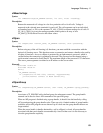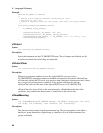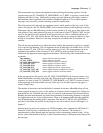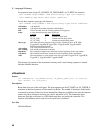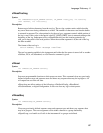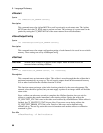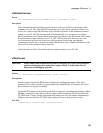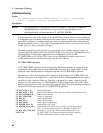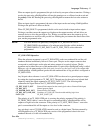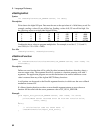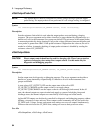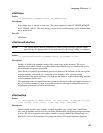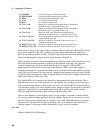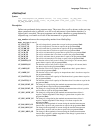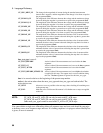
Language Dictionary - 6
91
When an output signal is programmed, the pin is driven by an open collector transistor. Writing a
word to the port using cfSetDigitalPort will turn the transistor on or off based on the word and
the polarity of the bit. Reading the port using cfGetDigitalPort returns the last value written to
the bit.
When an input signal is programmed, the state of the input can be read using cfGetDigitalPort.
Writing to the port has no affect on the bit.
When CF_DIG_INOUT is programmed, the bit can be used as both an input and an output.
Writing a word that causes the output to go high turns the output transistor off and allows an
external device to drive the port high or low. Writing a word that causes the output to go low
turns the transistor on and drives the port bit low. Reading the port returns the actual state of the
port, not the programmed value.
NOTE: If an even bit that was previously configured as CF_ISOLATED is set to
CF_GROUNDED, the attributes of its adjacent paired bit (the odd bit) default to
CF_GROUNDED, CF_DIG_INOUT, and CF_LOW_TRUE, unless otherwise
programmed.
CF_ISOLATED Operation
When the reference argument is set to CF_ISOLATED, each even numbered bit and the odd
numbered bit that immediately follows it form a pair. The pins on the output connector that
correspond to each bit-pair are the plus and minus outputs of an optical isolator. The bit
argument can be either the even or odd numbered bit of a pair when cfSetDigitalConfig is called.
However, only the even numbered bit of the pair is used to set the logic level of the output with
cfSetDigitalPort. cfSetDigitalPort ignores the odd numbered bits of any pair that is configured as
CF_ISOLATED.
Any bit-pair whose reference is set to CF_ISOLATED can be used as a general purpose output
by setting the signal argument to CF_DIG_OUT. The pair can also be used as an isolated fault
output by setting the signal argument to CF_EXT_FAULT_OUT. The following table
summarizes the signal choices for CF_ISOLATED operation:
CF_EXT_FAULT_OUT
External Fault output (has the same logical value as External Fault input)
CF_DIG_OUT
General purpose output
CF_POWER_FAIL_OUT
External Power Fail output.
CF_DIG_OUT_AND_NOT_
FAULT_IN
Combines a CF_DIG_OUT function with enabling logic from
CF_EXT_FAULT_IN.
The polarity of an CF_ISOLATED pair is set using the polarity argument. If the polarity is
CF_HIGH_TRUE, then a 1 sent to the pair’s even numbered bit by cfSetDigitalPort will be
output as a high level at the connector. If the polarity is CF_LOW_TRUE, then a 1 sent to the
pair’s even numbered bit will be output as a low level at the connector.
Any pair that is set to CF_ISOLATED cannot be used as a digital input. The data returned by
cfGetDigitalPort for a CF_ISOLATED pair consists of the programmed value in the even
numbered bit and a 0 in the odd numbered bit.
See Also
cfSetDigitalPort, cfGetDigitalConfig



